- Home
- Chris Wraight
Vaults of Terra: The Carrion Throne Page 26
Vaults of Terra: The Carrion Throne Read online
Page 26
More of Lermentov’s forces arrived in the chamber, many already limping and breathless. Yet more would arrive soon as the warbands caught up. Lermentov held up a closed fist, and Alvia, a woman who seemed to be his second in command, called the ogryns back and ordered the remaining fighters to form up.
‘What is it?’ Lermentov asked, approaching the opening warily.
‘You cannot smell it?’ Khazad asked, treading carefully.
Spinoza gave battle-sign for Hegain to come with them, and the storm troopers and Lermentov’s command group fell in behind them. The archway had half fallen in, leaving piles of rubble amid the pooling effluent, but the passage was still wide enough for them to enter in pairs. As they passed under the lintel, clusters of lumen beams swept across decaying brickwork, all plastered with patches of bleached lichen. Amid the streaks of glistening slime were patches of darker matter, and long scratches along the soft, rotten walls.
‘Proximity signals?’ voxed Spinoza, not trusting her helm unit.
‘Nothing,’ Hegain replied, staying tight on her shoulder, the lumen beam on his hellgun’s muzzle rippling across the tight spaces ahead.
The chill had become crippling, and puffs of condensing vapour issued from the storm troopers’ rebreathers. Spinoza felt something crack underfoot, and saw ice riming the puddles. The smell was becoming maddening – a toxic fug that crept under the skin, making her itch all over. The more she smelt it, the more she wanted to scream.
Then the air pressure suddenly relaxed, and the lumen beams angled up into a sweeping void above them. Things were suspended in the dark, bumping against one another, and the trickle of liquids echoed in the distance.
‘Can’t see a damned thing,’ said Lermentov, gesturing to one of his troops. ‘Get us some light.’
A soldier came forwards with a flare gun, angled it up into the murk and fired a charge. It spiralled up and up, throwing sparks behind it in a long trail, before the charge went off, releasing a slow-burn phosphor flare that drifted slowly back down to ground level.
The chamber was big – more then fifty metres up and perhaps twice that in length, burrowing back into the earth and supported by heavy hammerbeam arches. The walls were thick with the same slime as everywhere else, weeping in a curtain of semi-frigid mould-webs, but no one was looking at the walls.
The suspended objects were bodies. Eyeless corpses hung from the arches, throats pierced with spiked chain-lengths. The floor was littered with more bodies, contorted and broken. Bone glistened whitely from meat-slick muscle. Some cadavers still carried the instruments of agony within them, jutting like ice picks from ravaged skin, while others looked to have been sewn up, or sewn together, or rearranged in bizarre reconstitutions.
One of Lermentov’s troops pulled his helm off, bent double and vomited noisily. Others backed away, their lumen beams suddenly held less securely.
‘Hold,’ Lermentov ordered again, watching grimly as the flare gradually burned itself out. Then he turned to Spinoza. ‘You see this? You see this?’
Spinoza walked out across the carpet of limbs, scanning for more than corpse remnants. It was just as the lithocasts had been. None of these victims had died quickly. The sadism was daunting in its variety, even to one with her training.
‘Assassin,’ she voxed, treading carefully. ‘Recognise anything?’
‘Keep going,’ Khazad said sourly. ‘More to come.’
There was, much more. Soon the tally of pain became numbing, a charnel-yard of steadily freezing body parts, piled up, heaped into pyramids. There were what looked like gnaw-marks, and long gouges, and surgically precise incisions, all laced with ink-black webs of blood.
‘What… purpose?’ Hegain voxed, his normally equable voice shaken.
‘For this,’ said Khazad, pushing her way through a brace of hanging bodies.
Spinoza and Lermentov followed her, and were confronted by a series of metal cages running back into darkness along the near wall. Their design was like nothing Spinoza had even seen – curving, serrated, more like screens of thorns than artificial constructs. Each one was huge, fully three times the height of man. All were open, their doors swinging freely. Inside were half-frozen slops of what appeared to be pus, blood and clear liquids, splattered crazily. Tubes, empty and dripping, hung in clusters from the roof of each cage, many connected to glass vials.
Khazad turned to Lermentov. ‘That thing. What I call grotesque. Made here. In these cages. Fed on flesh, given chems. Should take years, but they can speed up, when they have to.’
Lermentov counted the cages. It was hard to tell how many in the dark – he stopped after thirty. ‘Do not allow any more of my people in here,’ he ordered his second. ‘Find another way round.’ He turned back to Khazad. ‘The creatures. They’re not here now. Where have they gone? Can we follow?’
There was a loathing in his voice now. Credit to him, thought Spinoza – his anger is greater than his fear.
‘You can follow them now if you are both blind and stupid,’ said Khazad. ‘They need no secrecy – they march. Are unleashed. Look, the trail goes.’
She pushed on, crunching over the bones, heading further down into the dark. The chamber seemed to have no end, disappearing eventually into a black haze of more tunnel mouths leading further down. Spinoza and Lermentov followed, accompanied by the storm troopers and those of Lermentov’s command who could stomach it.
Spinoza checked her orientation on her helm’s internal sensor. They were moving north now, having already come a long way. Only one thing lay in that direction, and the thought of it made her shiver.
‘We need to be quicker,’ she urged, imagining the horrors loping down the tunnels ahead of them, goaded by whatever master had created them. Just one of them had taken an entire army to capture. It was disconcerting to think what so many could accomplish.
Just as they neared the hall’s far end, she was disturbed by a sudden movement to her left. She spun round, ready to deploy Argent, only to see one of the corpses shift. It slid down the heap, slick and fluid, and a trembling hand reached out from under the pile. Like some horrific underground parasite, human shoulders emerged, extending a trembling arm.
‘Pl… ea…’ a calloused face croaked. The owner of it tried to claw her way out from under the mass of suppurating flesh.
Spinoza crouched down, ready to extend her hand, when she saw what remained of a woman’s torso. Or rather, how those remains had been grafted, and how many more vials pulsed steadily into that long swelter of naked organs and shivering skin-scraps.
The woman’s face was agonised, sent mad with pain and terror, her eyes milky and unseeing, her bloodied fingers shaking in bewildered shock.
‘His grace, sister,’ said Spinoza quietly, taking her laspistol and pressing it to her forehead. The flash of light was brief, and the shaking stopped.
Spinoza stood back up, only to see Lermentov watching her.
‘You see it, now?’ he said again, insistent, outraged.
‘We will find them,’ was all she said, pushing past. ‘We will find them.’
Chapter Twenty-Three
Revus greeted Crowl with a curt nod. Gorgias flew overhead, its eye pulsing with what looked like indignation.
‘Molto tempus,’ the skull voxed. ‘Kick-kick heels.’
The landing platform extended out across the summit of the guard tower, high up on the southern face of a big defence bastion. The sun was setting again, marking the end of another day of frenzy below. Lights began to flicker on across the expanse of the great wall, accompanied by searchlight beams piercing the encroaching gloom. A heavy troop-carrier powered overhead, destined for the Lion’s Gate approaches, its underside studded with cluster-charges. The drums had started up again, booming in the chasms, and the lightning flashes had grown stronger. It was hot, just as ever, and it was febrile, like the breaking cusp of some planetary fever.
The Shade waited on the apron, guarded by white-robed Palace sentinels. Other ships stood around it, their engines winding down in the parched wind. One of them, a gold flyer-barge with ebon livery, was dispatching a cargo of high-ranking Ministorum dignitaries, their robes flapping over fat-slick bodies.
‘Did you use the time well?’ Crowl asked, making for the flyer.
‘Not what you hoped for, but something,’ said Revus.
They climbed up to the cockpit, and Gorgias swooped under the canopy as it hissed closed. Revus took the controls, winding up the engines.
‘And you?’ the captain asked.
‘I was shown… things.’ It was still difficult to talk about. ‘And discovered some more.’
‘Where to?’
‘Xericho perimeter section. I will shunt you the coordinates.’
Revus applied the power, and the Shade rose into the air, sending turbulence buffeting across the apron. He tilted the angle a little, sending a blast of downdraught at the tottering cardinals and making their robes billow.
Crowl snorted a laugh. ‘Now, then,’ he said.
Then the Shade was rising above the platform, high into the evening sky. The domes of the great cathedrals were lit by a faint sheen of gold, competing briefly with the haze of blood-red rising up from the smoky pyres. In the distance, Crowl made out the Titanolith of the Holy Primarch Corax, standing in gaunt splendour as the rays of dying light played over his drawn face.
‘Tell me,’ said Crowl.
‘We were watched the whole time,’ said Revus. ‘But the skull was useful.’
‘Tergiversatio,’ said Gorgias. ‘Subterfugio. No one suspects.’
‘And you found?’
‘Nothing concrete,’ said Revus. ‘Quantrain’s base of operations is a long way inside. You’d not get close to it if you had fifty years. But the skull accessed a comms system in the approach tower. There were frequencies to extract, coded channels.’
‘And you cracked the codes, because…’
‘…they were in Hereticus cipher. You can try them. I do not guarantee success.’
‘It’s a start. Give me access.’
Gorgias bobbed closer, activating its ethercloud resonance vane. Crowl’s internal comm-augmetic picked it up, and a selection of possible vectors slid over his retinal feed. The activity made his already severe headache crippling, and he winced. His calves were throbbing, his joints on fire. Still, no glanding. Not now.
‘This is no good,’ Crowl said, cycling through the options. ‘This is ancient. These I do not recognise. These… now, this one. Well done. This one.’
He applied the comm-vector, negotiated the internal ciphers, pulled up its internal screeds. It took a few moments – even inside the Outer Palace wards the grids were under severe strain. Then the connection was made. It was an old audex-capillary, one-way only, an emergency vector for use, no doubt, by Quantrain’s aides alone.
‘My Lord Flavius,’ voxed Crowl. ‘Speaker is Inquisitor Erasmus Crowl, O.H. You have mislaid something, I think. I believe I have located it. You may join me, if you wish, at the base of the Xericho wall section. Precise location to be determined, but you will, I trust, know what you’re looking for. Bring some friends – your guests are proving quite troublesome.’
Revus laughed as the link closed. It was rare for Revus to laugh, and the sound was unpleasant. ‘Wise, to tell him?’
‘I want to see his face,’ said Crowl, losing his smile. He caressed the hilt of Sanguine absently. ‘I want to see it, and then I want to know why.’
The Shade pulled out east, heading low over the sea of jumbled domes and spires. The sunset was dying fast, draining the light out of the sky and leaving only the growling undercurrent of the fires below. Crowl looked over his shoulder to see the mausoleum of the Sanctum Imperialis wallowing amid the press of lesser structures.
‘Understandable,’ said Revus, picking up a little speed. The wall loomed ahead of them, sweeping up out of the morass in a sheer black face like carved flint. Defence towers emerged from the smog, gothic-roofed, festooned with lascannon batteries, underpinned with volcano cannon emplacements. ‘But, with respect, there are only two of us.’
‘Tertio,’ interjected Gorgias.
‘Not quite,’ said Crowl, settling back into his seat. ‘Observe your proximity scanner, bearing four five oh.’
Revus switched vid-feeds to match the coordinates, and the screen filled with gold. He looked up at Crowl, surprised, and then banked the Shade to bring the origin into visual range of the cockpit.
A heavy flyer filled the sky, turreted and crenellated, powered by enormous down-burners that kept it aloft on a curtain of booming soot. Thick, down-angled wings jutted from a bulbous superstructure marked with the emblems of the Adeptus Terra and surrounded by fabulous arcana picked out by inlaid rubies and silver wire. Rows of underslung autocannons competed with what looked like heavy bolter emplacements, crowding over a sunken cockpit cowled by a jewelled spine-vane. It was bigger than a Thunderhawk and embellished further than a cardinal’s pleasure-barge – more an airborne oratory than a ship of war, and yet its deadliness could not be in any doubt.
‘Striking, is it not?’ Crowl said, smiling. ‘Or obscene, depending on your taste.’
‘Your Custodian friend?’ asked Revus, resuming course with the golden flyer thundering alongside.
‘Not a friend. Not yet, anyway,’ said Crowl, turning his attention to the walls. ‘Gorgias, you will be required here. You have records of the radiation signature from the Rhadamanthys?’
‘Affirmativo, yes-yes.’
‘I want them online and fed to the Shade’s augur net. That is what we are scanning for, somewhere down there. It’ll be far below ground – ready the auspex for close-range use.’
He peered out through the narrow slit of armourglass, watching the walls swim towards them. As yet his Shade and the Custodian flyer were the only aircraft in that vicinity, and there was no sign of other Inquisition craft rushing to join them. The last shafts of sunlight faded away, plunging the vista below into a pall of lumen-studded darkness. The transitways were like blazing arteries, corridors of flame that stretched out into the night in vast spokes.
‘Any word from Spinoza?’
‘I will keep trying,’ said Revus.
Crowl nodded, watching the eternal parapets approach – the ramparts from which men had once gazed on the approach of the Warmaster’s Legions. They looked unbreakable, forged in the Age of Wonder and bolstered by millennia of constant vigilance. No army had come close since those half-forgotten days, and the sentinels had stared across nothing but a vista of slow degradation for a long time.
Never regret that war has become our race’s constant state, Crowl recalled, reputedly the words of the primarch Rogal Dorn. Treat it as a friend, the means by which we keep our vigour. In conflict, strength. In vigilance, only decay.
‘Down there, somewhere,’ he murmured, reflecting on that. ‘And still unseen.’
From the undervaults of Armengand, Lermentov drove them hard. They pushed into wider, deeper outfall tunnels, ringed with bars of crumbling iron and now as dry as dust. Soon the passages became vast, great man-made shafts under the world’s roots, and the entire army coalesced again, running fast, their helm-beams swaying against the wide sweep of the inner walls.
Spinoza said nothing to the False Angel. Lermentov had not spoken since leaving the charnel chambers, and now moved with a grim fury, his lasgun held ready for use. Khazad had been right – it was trivially easy to follow the path taken by the abominations, and slime and blood coated the walls, mingling with the detritus of under-urban filth. They had even come across one of the xenobreed creatures abandoned on the way. It was some kind of stillborn horror, only half converted into a full grotesque, its ribs poking from its chest and its organs pulsing in glistening sacs.
It had tried to fight them, propelled by the stimms that mercilessly injected into its half-finished circulatory system, but its tendons snapped before it could lift its claws. The ogryns stamped it into the ground, crushing its skull and skeleton under their massive ironshod boots, but even then it took a long time to die, screaming the whole time.
Then they were running again. The stench began to grow once more, cloying in their nostrils as they panted. Spinoza looked over her shoulder, trying to gauge the condition of Lermentov’s ramshackle army. The ogryns were driving ahead just as powerfully as ever, their heads swinging as they snorted and bucked. Most of the vanguard, including the better-equipped of the Angel’s Tears, were keeping up, but many more were struggling with the pace.
‘They will not last more than moments,’ she voxed to Khazad.
‘No,’ the assassin agreed. ‘But grotesques not masters. There will be master. Kill it, and there is chance.’
‘If we can get to it.’
The ground started to rise again. Soon they were moving up, and the brickwork walls gave out, replaced by stands of ancient stone. The ambient temperature started to rise, and Spinoza began to sweat. The stench, the claustrophobic tunnels, the endless dark – it was interminable and hateful, just like everything else on this damned world.
They came across bodies. Like most of the catacombs under the shadow of the walls, these places had harboured a kind of life, scratching food and shelter in the grim holes of the underworld. These corpses were ripped apart, a collection of strips and entrails, thrown in a madness of rage against the stone. They must have been fleeing, disturbed by the xenos suddenly emerging from the deeps, and had never stood a chance.
‘Getting close to the walls, lord,’ voxed Hegain, studying his auspex. ‘This was the target, then. The Lord Crowl–’
‘–was right, sergeant,’ said Spinoza. ‘I am aware of it. Your squad is prepped? We will not get much help from the others.’
‘All ready, lord. All prepared. And very much in the mood, lord, if you take the meaning of it.’ Hegain’s tone was grim. ‘I’ll look forward to seeing more of those things. I’ll look forward to it very much.’

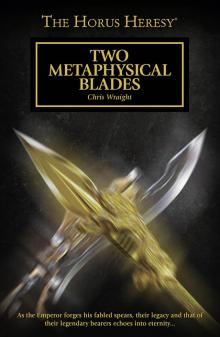 Two Metaphysical Blades
Two Metaphysical Blades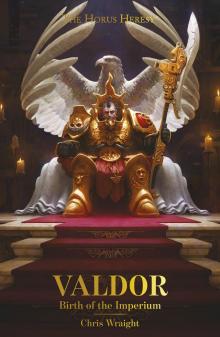 Valdor: Birth of the Imperium
Valdor: Birth of the Imperium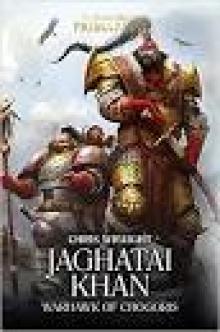 JAGHATAI KHAN WARHAWK OF CHOGORIS
JAGHATAI KHAN WARHAWK OF CHOGORIS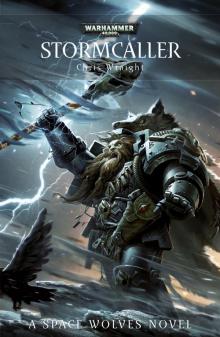 Stormcaller
Stormcaller Child of Chaos
Child of Chaos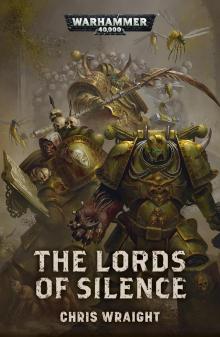 The Lords of Silence
The Lords of Silence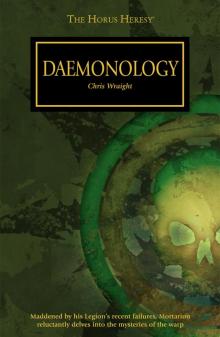 Daemonology
Daemonology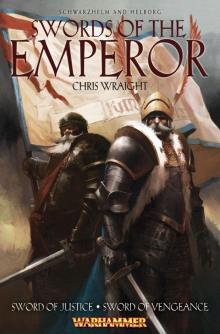 Swords of the Emperor
Swords of the Emperor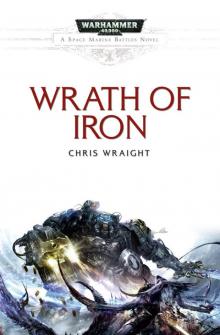 Wrath of Iron
Wrath of Iron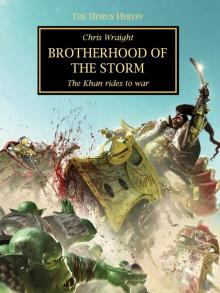 Brothers of the Storm
Brothers of the Storm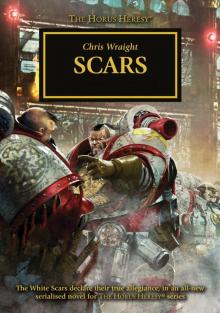 Horus Heresy: Scars
Horus Heresy: Scars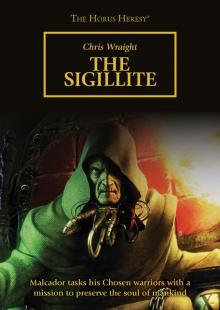 The Sigillite
The Sigillite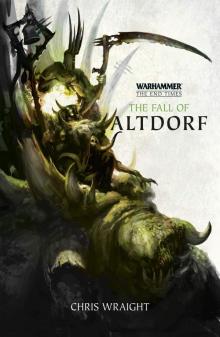 The End Times | The Fall of Altdorf
The End Times | The Fall of Altdorf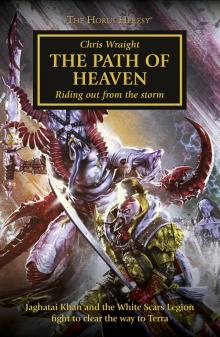 The Path of Heaven
The Path of Heaven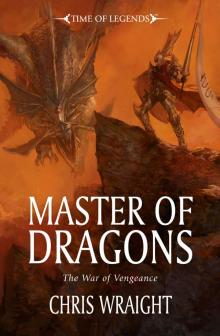 Master of Dragons
Master of Dragons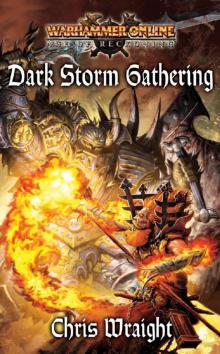 WH-Warhammer Online-Age of Reckoning 02(R)-Dark Storm Gathering
WH-Warhammer Online-Age of Reckoning 02(R)-Dark Storm Gathering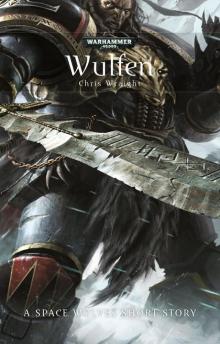 Wulfen
Wulfen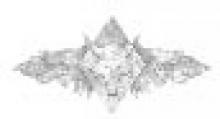 Battle Of The Fang
Battle Of The Fang Onyx
Onyx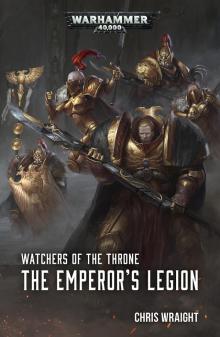 Watchers of the Throne: The Emperor’s Legion
Watchers of the Throne: The Emperor’s Legion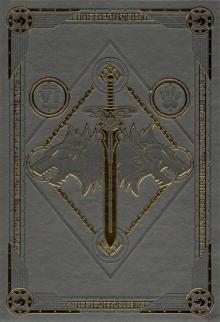 Leman Russ: The Great Wolf
Leman Russ: The Great Wolf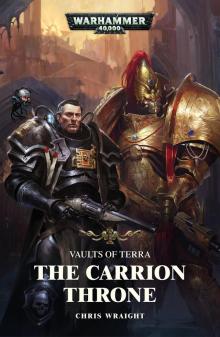 Vaults of Terra: The Carrion Throne
Vaults of Terra: The Carrion Throne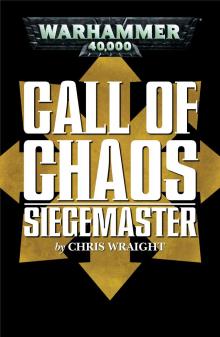 Siegemaster
Siegemaster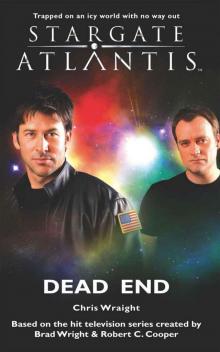 STARGATE ATLANTIS: Dead End
STARGATE ATLANTIS: Dead End Scars
Scars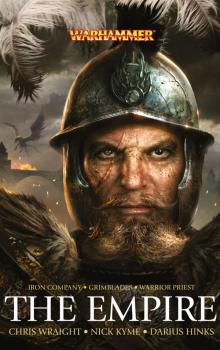 The Empire Omnibus
The Empire Omnibus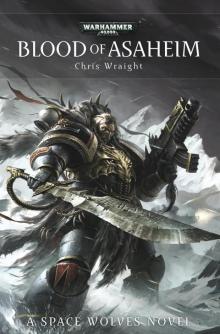 Blood of Asaheim
Blood of Asaheim